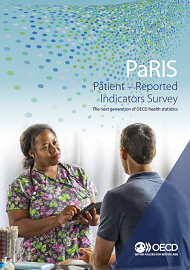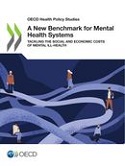Health
Mental Health
|
Mental ill-health can have devastating effects on individuals, families and communities, with one in every two people experiencing a mental illness in their lifetime. Symptoms of anxiety and depression as much as doubled at the height of the COVID-19 pandemic, and a confluence of emerging and enduring crises – such as the cost-of-living and climate crises – continue to heighten the risk factors for poor mental health. Mental ill-health also weighs heavily on societies and economies: its economic burden can rise to up to 4% of GDP. Mental health issues are debilitating for those who have to live with them, with significant social implications. Individuals experiencing mental-ill health have poorer educational, employment, and physical health outcomes than those in good mental health. Yet, two thirds of people seeking mental health support reported difficulties getting it. OECD work on mental health looks at deepening understanding of the population burden of mental ill-health, improving mental health promotion and ill-health prevention, measuring the performance of mental health systems, recommending best practices across health, employment, education and social welfare policies, and promoting a more integrated approach to mental health policy. |
KEY DATA
At the start of the pandemic, the share of the population reporting symptoms of anxiety and depression increased in all OECD countries with available data, and as much as doubled in some countries. the prevalence for 2022 remains at least 20% higher than pre-pandemic, and in some cases over double or triple the pre-pandemic rate.
National estimates of prevalence of depression or symptoms of depression, 2019-22 (or nearest year)
Note: Survey instruments and population samples differ between countries and in some cases across years within countries, which limits direct comparability. Pre-pandemic data for the Czech Republic 2017; Canada 2015-19; Japan 2013; Belgium 2018; United Kingdom 2019-March 2020; Korea 2016-19.
Source: National data sources – see the Statlink for full details.
In Mental health, Fig. 3.19, Health at a Glance 2023: OECD Indicators.
STRENGTHENING MENTAL HEALTH SYSTEMS
|
|
Released June 2021 A good mental health system helps people stay in good mental health, and connects those in need to appropriate support to manage their mental health condition or even fully recover from it. This timely report provides an in-depth analysis of how well countries are delivering the policies and services that matter for mental health system performance. This report sets up a framework for understanding mental health performance through internationally comparable indicators, an approach set to grow stronger still in the coming years as more data become available.
|
MEASURING MENTAL HEALTH
 |
OECD work helps countries improve their understanding of population mental health needs, and the quality, outcomes and experiences of people using mental health services. The OECD Patient-Reported Indicator Surveys (PaRIS) initiative aims to develop international benchmarks of health system performance as reported by patients themselves, and includes a focus on collecting the experiences and outcomes of users of mental healthcare services. This new international survey focuses on patients with one or more chronic conditions, including mental health conditions such as depression or anxiety, who are living in the community and who are largely treated in primary care or other ambulatory care settings.
|
Integrated Mental Health, Skills and Work Policy
The Recommendation of the OECD Council on Integrated Mental Health, Skills and Work Policy (2016) marked the recognition by OECD countries that the obstacles to ensuring good mental health for all individuals cannot be overcome within the health system alone, and that it requires a “mental-health-in-all-policies” whole-government approach. Five years later, the OECD assessed progress achieved in the policy areas covered by the Recommendation (health policy, youth policy, workplace policy, and welfare policy), and found that in most OECD countries much more will have to be done to implement the principles and fulfil the promises of the Recommendation.
- Read the report Fitter Minds, Fitter Jobs - From Awareness to Change in Integrated Mental Health, Skills and Work Policies (2021), which summarises steps taken by OECD countries in the five years following the Recommendation
- Learn more about Mental health and work and access the latest reports and data, or contact Mr. Christopher Prinz (christopher.prinz@oecd.org) in the OECD Skills and Employability Division for further information
TACKLING THE MENTAL HEALTH IMPACT OF THE COVID-19 CRISIS
The COVID‑19 crisis has heightened the risk factors generally associated with poor mental health – financial insecurity, unemployment, fear – while protective factors – social connection, employment and educational engagement, access to physical exercise, daily routine, access to health services – fell dramatically. This led to a significant and unprecedented worsening of population mental health, especially for young people.
Explore OECD work on mental health during the COVID-19 crisis, and strengthening mental health system resilience:
- Tackling the Mental Health Impact of the COVID-19 Crisis
- Supporting Young People’s Mental Health through the COVID-19 Crisis
- Health at a Glance: Europe 2022 - State of Health in the EU Cycle, see the indicator on Adult mental health
- Ready for the Next Crisis? Investing in Health System Resilience, see Chapter 8 on Protecting mental health
- COVID-19 and Well-being: Life in the Pandemic
FURTHER READING
- Strengthening community-based mental health care in Lithuania: recommendations report (April 2024)
- Mental Health indicators in Health at a Glance 2023: OECD Indicators (November 2023)
- How to Make Societies Thrive? Coordinating Approaches to Promote Well-being and Mental Health (October 2023), from the Centre on Well-being, Inclusion, Sustainability and Equal Opportunity (WISE)
- Measuring Population Mental Health (March 2023), from the Centre on Well-being, Inclusion, Sustainability and Equal Opportunity (WISE) - Also available in Korean
- Win-win solutions for well-being and mental health (October 2023), as part of the OECD Policy Insights on Well-being, Inclusion and Equal Opportunity series
- The provision of community-based mental health care in Lithuania, OECD Health Working Paper No. 143 (2022)
- Thematic chapter "Promoting mental health in Europe: Why and how?" in Health at a Glance: Europe 2018 - State of Health in the EU Cycle
- Read our Policy Brief on Children & Young People’s Mental Health in the Digital Age - Shaping the Future (2018)
- Understanding Effective Approaches to Promoting Mental Health and Preventing Mental Illness, OECD Health Working Paper No. 97 and Annex (2017)
- Making Mental Health Count: The Social and Economic Costs of Neglecting Mental Health Care (2014)
- Browse through our list of Health publications
- Learn more about our work on Health policies
CONTACT US
- Ms. Emily Hewlett: emily.hewlett@oecd.org
 Follow us on Twitter via @OECD_Social
Follow us on Twitter via @OECD_Social
Related Documents

